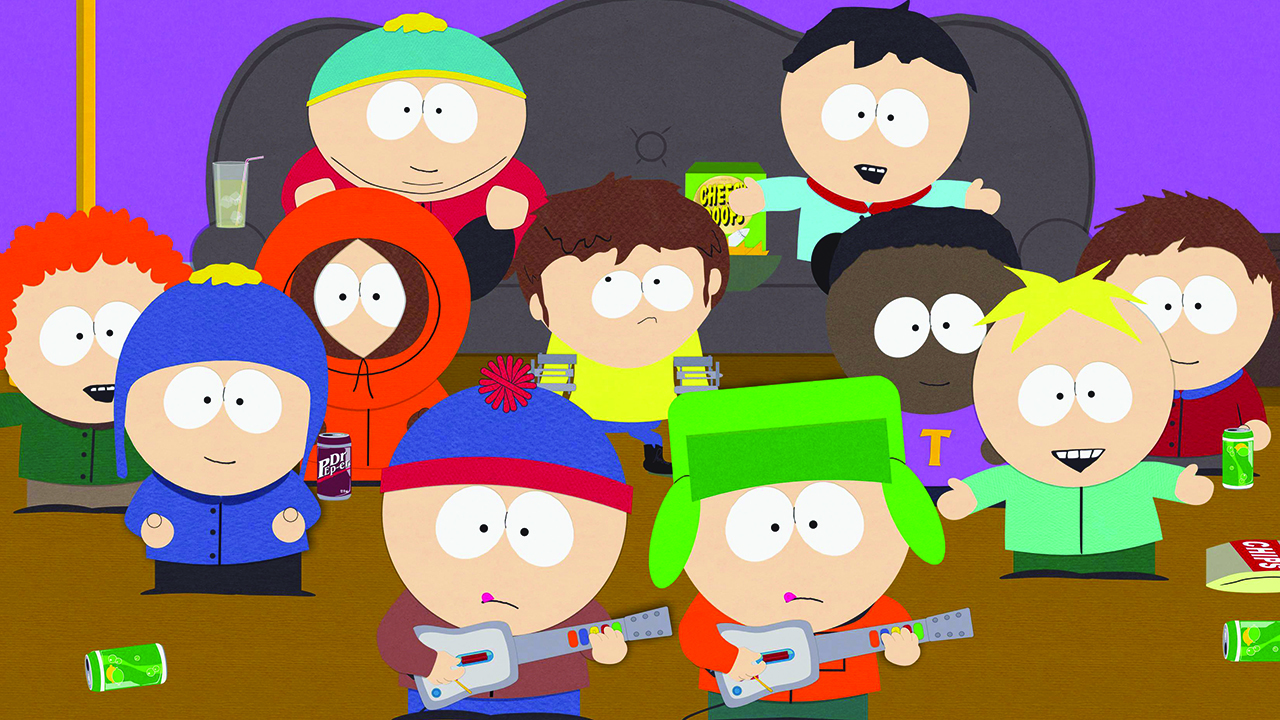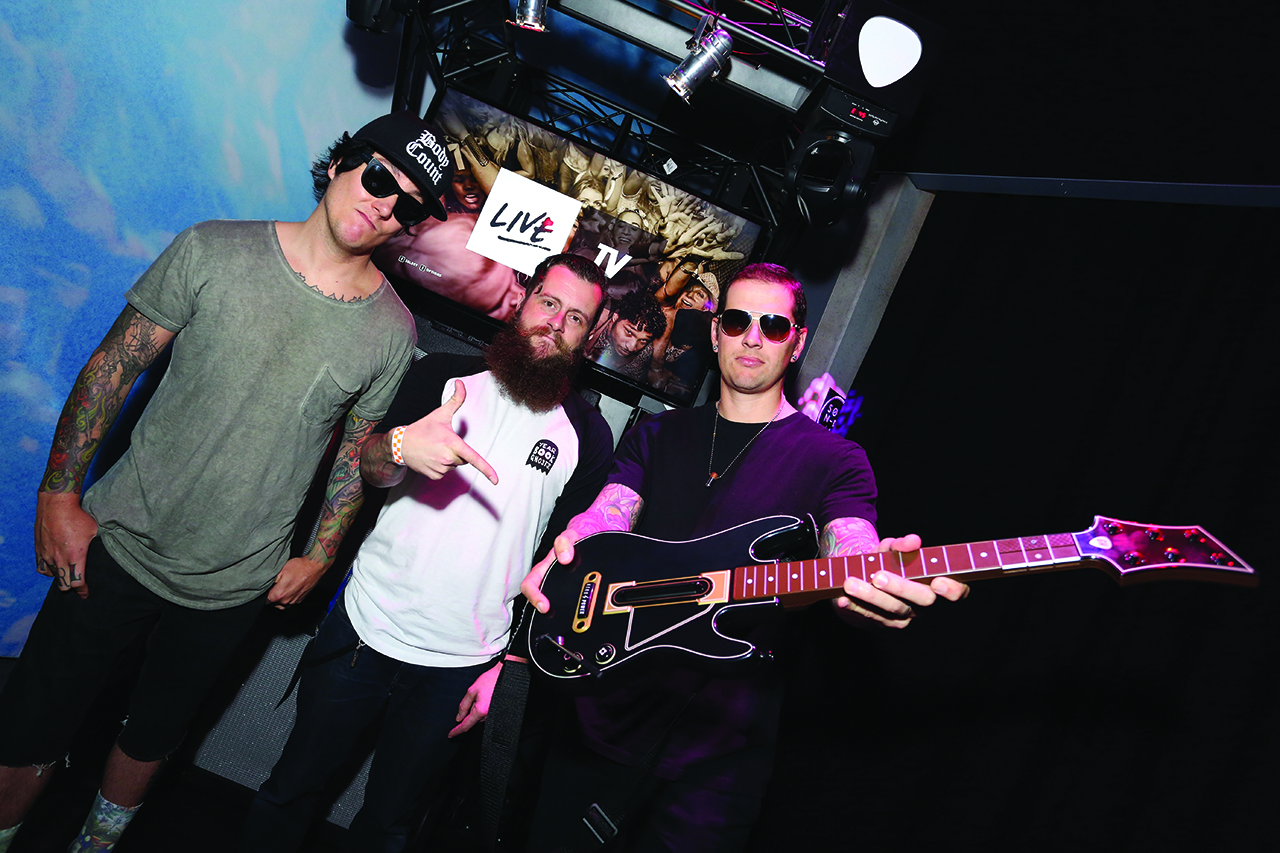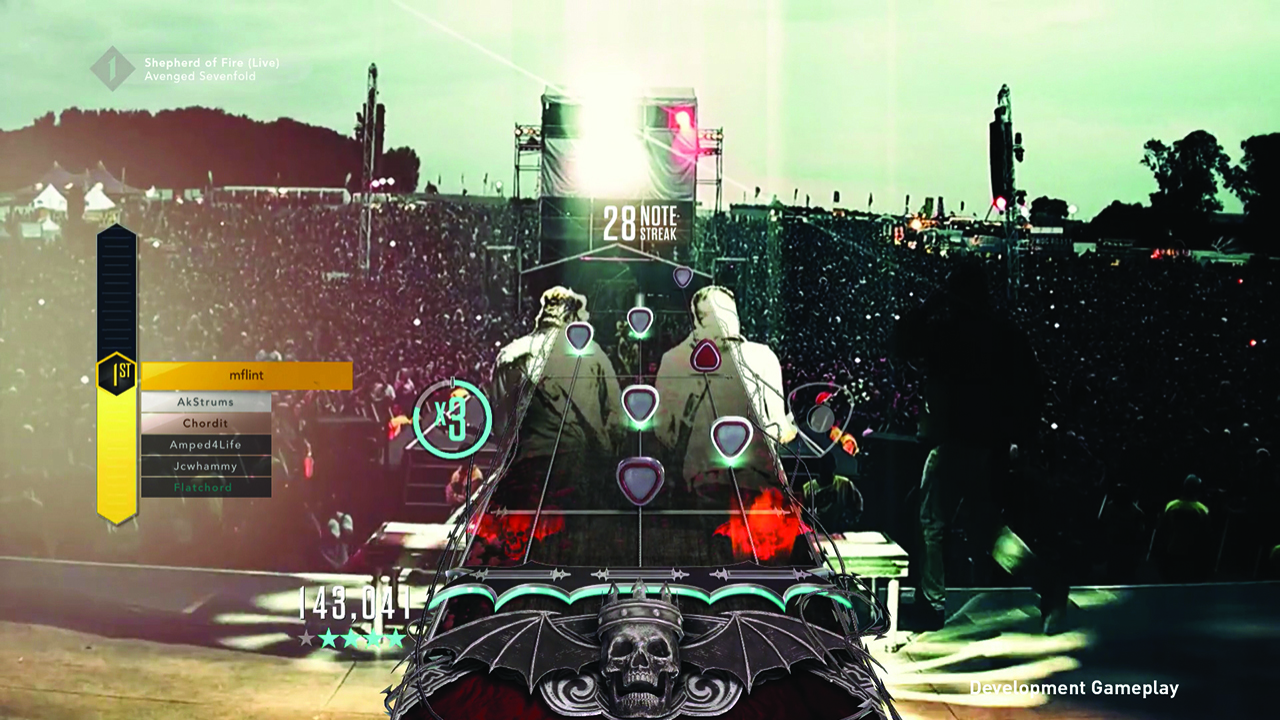Stan Marsh and Kyle Broflovski stand in front of a TV, tapping out Kansas’ Carry On Wayward Son on plastic guitars in front of their friends. Aiming to impress them, dad Randy Marsh picks up his actual six-string and plays the song properly. The kids remain unmoved. “Real guitars are for old people,” Cartman shrugs.
Airing in late 2007, South Park episode Guitar Queer-O drew 4 million viewers and captured the zeitgeist, where music gaming was at its height. The idea of rock games wasn’t new; there had been a Journey arcade game in 1983, a Motörhead beat ’em up and a Mötley Crüe pinball game in 1992, an Aerosmith-themed shooter in 1994, and Iron Maiden blaster Ed Hunter in 1999. But it was 2005’s Guitar Hero that presented the revolutionary concept of allowing players to perform songs within a game.
Again, rhythm games were not a new idea – in 1996, PaRappa The Rapper on PlayStation let players tap buttons to make a dog rap. What made Guitar Hero so different was that it offered well-loved rock and metal songs, including Black Sabbath’s Iron Man, Ozzy Osbourne’s Bark At The Moon and Pantera’s Cowboys From Hell. The game’s popularity resulted in a billion-dollar franchise and a slew of sequels, including band-specific titles such as Guitar Hero: Metallica. Two years later, Harmonix (then owned by MTV Games) gave audiences Rock Band, which expanded on the template by offering gameplay for drums and vocals – a feature Guitar Hero would later adopt. Another billion-dollar title was born, spawning sequels and specials such as The Beatles: Rock Band.
Music games were a force to be reckoned with, overtaking the revenue of actual music releases and boosting the career of many bands – Aerosmith saw a 40% leap in sales following the release of Guitar Hero: Aerosmith in 2008. Music gaming became embedded in music and popular culture; Download festival hosted competitions, and many a post-pub happening saw friends gathering around a console. But as quickly as it had arisen, the genre appeared to burn out, and by late 2010 both franchises were effectively put on hold, with controllers left to collect dust behind the sofa while gamers moved onto pastures new.
Now, after a five-year hiatus, the two franchises are making a high-profile comeback this month. Harmonix bring us Rock Band 4, while developer FreeStyleGames and publisher Activision (who now handle the Guitar Hero franchise) offer up Guitar Hero Live. So why is this happening now?

The driving factor appears to be the opportunities offered by the latest generation of consoles. “Videogames are one of the only forms of entertainment made obsolete with every new generation of hardware,” explains Daniel Sussman, Product Manager of Rock Band 4, who has not only been with the franchise since its creation, but was the producer of the original Guitar Hero. “When things moved from video to DVD, for example, a lot of stuff got carried forward, but that doesn’t always happen in videogames, so we felt we had a responsibility to make sure Rock Band – which I feel represents a fantasy that is extraordinarily common – doesn’t fade away. And this is right where we were in the cycle with the first game with the PS3 and Xbox 360.”
Rich Orchard, Music Supervisor at FreeStyle-Games, the developer of Guitar Hero, agrees that new hardware has moved music gaming forward. “At the time we felt it was right to take a pauseon Guitar Hero,” he explains. “But it was always said that it would come back when we felt there was an innovation that merited the return of the franchise. I think the timing of this new generation of consoles certainly helped that all slot into place.”
Offering innovation while rejuvenating the successful elements of the past has been a priority for the two franchises. While both games had ended up utilising a ‘full-band’ approach, Guitar Hero now returns to its roots and focuses on the lead guitar, introducing a new controller. Even more significant is the ‘live’ aspect hinted at in the name; it not only offers considerable online content, but emphasises a feeling of performance by simulating a real audience using actors and sets – an approach that explains the game’s early code name, ‘Stagefright’. Avenged Sevenfold have been intimately involved, providing exclusive live recordings as an incentive to pre-order the game.
“At Download we filmed our shows and were able to cut it the way we wanted, so fans could feel like they are pretty much onstage with us,” explains vocalist M. Shadows. “They also filmed a bunch of people with a lot of green screen so it feels like a European festival, and when you’re playing badly the rest of the band will kind of look at you mad, people will start booing, and the drummer will look at you, like, ‘What the fuck?’ So it’s a lot more interactive than the old games.”
Interactivity and immersion are also concerns for Rock Band 4, which continues to focus on the ‘group of friends in a room’ dynamic, while pushing the creative element of the game, allowing players to whip up their own solos instead of just recreating the originals.
“As a musician, an implicit thing in everything I do is the act of creation,” explains Harmonix’s Daniel. “When I play guitar, even if I’m playing someone else’s song, it’s me playing that song, and if I decide I want to go off-script, I can.
We wanted to come up with features that would address that, and now when you do things that are improvisational and they work, it feels great.”

Exclusive features aside, a major factor in both games’ desirability – perhaps the biggest factor for anyone truly interested in music – is the choice of tunes. Already confirmed for both titles are a number of Hammer-
friendly songs, and several bands appear in both games, including Judas Priest, Dream Theater and, indeed, A7X. M. Shadows explains that the medium of games is vital to the band’s reach.
“The first game we were in was Madden NFL 2004,” he recalls. “After we played House Of Blues, all the security guards were like, ‘You’re the guys from Madden!’ That was the first time we saw people who knew our songs that didn’t know A7X. We did a survey on our website, and it was mind-boggling how much Madden, Need For Speed and Guitar Hero came up as the ways people had discovered us. It’s a huge tool. They’re doing promotional things that a band like us could never pull off – YouTube videos that have 50, 60 million people watching.”
FreeStyleGames’ Rich agrees that games are a great way to get rock into people’s ears. “Previous games certainly took bands to a much wider audience,” he says. “Dragonforce are an example that is always cited, because they weren’t massively well-known, but they were in a game that took off and became a big thing, and a lot of people became aware of them because of that.”
The use of Dragonforce’s Through The Fire And Flames on Guitar Hero III: Legends of Rock threw the band into the spotlight, though their real-life guitar hero, Herman Li, explains they also experienced a backlash.
“It was kind of a double-edged sword,” he admits. “Some people suddenly started to hate us because their little sister was now playing Dragonforce songs on Guitar Hero, but at the same time, we had lots of new fans. We broke through to an audience who had never listened to metal and now they know Dragonforce – that song was even on The Ellen Degeneres Show. It’s funny – even now we’re still one of the most talked-about bands in relation to that game, and how many more games have there been and how many more songs? But we have no regrets being in the games. If asked, we’d be happy to make another contribution. And we still sign a lot of controllers!”
As with music-streaming platforms such as Spotify, a number of labels complained that the licensing deals involved meant low payouts from game makers. At the same time, these games offer an effective promotional vehicle in an era of declining radio and music television, allowing bands to reach a whole new level. And perhaps, in an era where rock and metal is increasingly hidden by mainstream media generally, it can help boost those genres as a whole.
“What we are hoping is to put rock music in the focus,” concludes Daniel. “That hasn’t really been in the case in the last few years, if you look at the Top 40. I like the idea that we can disrupt the cultural space and remind people that, you know, the Scorpions are an awesome band; that there is great music that plays well and can reignite a passion for rock’n’roll.”
To what extent music games will succeed in 2015 remains unknown, though all parties concede that the extraordinary boom the genre enjoyed a decade ago is unlikely to be repeated. But if video views and online gossip are anything to go by, there’s still an audience hungry to play their favourite songs on a plastic guitar.
Rock Band 4 is out now. Guitar Hero live is out on October 23
